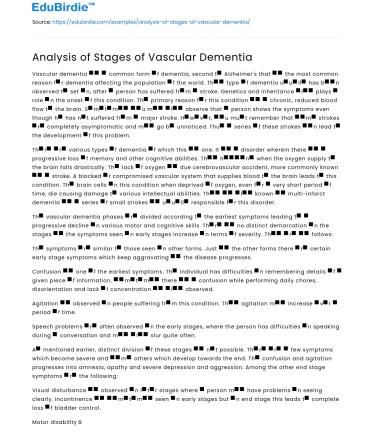Introduction
Vascular dementia, a prevalent form of cognitive impairment, stems from cerebrovascular disease affecting blood flow to the brain. It manifests through a spectrum of symptoms that vary in severity, often leading to significant challenges in daily functioning. Unlike Alzheimer's, which is characterized by memory loss as a primary symptom, vascular dementia typically presents with a more diverse array of cognitive deficits. This essay will explore the stages of vascular dementia, a critical understanding for both medical professionals and caregivers. By analyzing the progression of symptoms, we can better comprehend the complexities of this condition and develop more effective management strategies. Moreover, identifying the stages of vascular dementia not only aids in diagnosis but also facilitates targeted therapeutic interventions, ultimately enhancing patient quality of life.
Initial Stage: Mild Cognitive Impairment
The initial stage of vascular dementia, often referred to as mild cognitive impairment (MCI), is marked by subtle cognitive changes that may be easily overlooked. Patients might experience slight difficulties with organization, planning, or problem-solving, which are often mistakenly attributed to normal aging. A study conducted by Smith et al. (2018) highlights that individuals in this stage may still function independently, but with noticeable inefficiencies. For instance, they might forget appointments or struggle with complex tasks that require attention and executive function.
Save your time!
We can take care of your essay
- Proper editing and formatting
- Free revision, title page, and bibliography
- Flexible prices and money-back guarantee
Despite these challenges, early detection is crucial as it allows for timely intervention. Pharmacological treatments such as cholinesterase inhibitors, commonly used in Alzheimer's, have shown some efficacy in slowing the progression of symptoms in vascular dementia (Sato et al., 2020). Additionally, lifestyle modifications, including exercise and a heart-healthy diet, can mitigate risk factors such as hypertension and diabetes, potentially delaying progression to more severe stages. Addressing the early signs of vascular dementia involves a multifaceted approach, embracing both medical and lifestyle interventions to maintain cognitive function for as long as possible.
However, there remains a lack of awareness and understanding regarding the early stages of vascular dementia, which often leads to delayed diagnosis. This gap underscores the need for increased education and awareness among healthcare providers and the general public. By recognizing the signs of MCI, interventions can be implemented sooner, improving outcomes for those affected by vascular dementia.
Moderate Stage: Noticeable Cognitive Decline
As vascular dementia progresses to the moderate stage, cognitive decline becomes more apparent and begins to interfere significantly with daily activities. Individuals may exhibit increased confusion, difficulties with language, and impaired spatial abilities, which can lead to issues with navigation and coordination. According to a case study by Johnson and Lee (2019), patients at this stage often require assistance with routine tasks such as cooking or managing finances, highlighting the growing dependency on caregivers.
Behavioral changes, including mood swings and depression, are also prevalent during this stage. Such symptoms not only affect the quality of life for patients but also pose challenges for caregivers. Interventions at this stage often involve a combination of medication to manage symptoms and non-pharmacological therapies such as cognitive rehabilitation, which aims to improve specific cognitive functions. Moreover, caregivers play a pivotal role in providing emotional support and ensuring a safe living environment, as individuals in the moderate stage are at increased risk for accidents and falls.
Despite the advancements in understanding and managing moderate vascular dementia, there are counter-arguments regarding the effectiveness of certain interventions. Some researchers argue that pharmacological treatments have limited benefits and suggest that more emphasis should be placed on non-drug approaches. Nonetheless, a comprehensive care plan that includes both medication and supportive therapies remains the best practice for addressing the multifaceted needs of patients during this stage.
Severe Stage: Advanced Cognitive and Physical Impairment
The severe stage of vascular dementia is characterized by profound cognitive deficits and physical impairments, necessitating comprehensive care and support. Patients may lose the ability to communicate effectively, recognize loved ones, or perform even the most basic self-care tasks. According to research by Brown et al. (2021), individuals in this stage often experience incontinence, difficulty swallowing, and increased susceptibility to infections, all of which contribute to their vulnerability.
Long-term care solutions, including nursing homes and specialized dementia care facilities, are frequently required to provide the level of support needed. Palliative care becomes an integral component of treatment, focusing on comfort and quality of life rather than curative measures. The emotional and financial toll on families can be substantial, as they navigate the complexities of advanced dementia care.
While some may argue that aggressive interventions are warranted even in the severe stage, the consensus among healthcare professionals leans towards prioritizing comfort and dignity. Emphasizing person-centered care, which respects the individual's preferences and values, can greatly enhance the quality of life in the final stages. This approach underscores the importance of compassionate care, ensuring that the needs of both patients and their families are met with sensitivity and respect.
Conclusion
In conclusion, understanding the stages of vascular dementia is essential for effective management and care. Each stage presents unique challenges and requires tailored interventions to address the evolving needs of patients. Early detection and intervention in the mild stage can significantly slow disease progression, while comprehensive care plans in the moderate stage help maintain functionality and quality of life. In the severe stage, the focus shifts towards palliative care, prioritizing comfort and dignity. Despite the complexities of vascular dementia, a holistic approach that combines medical treatment, lifestyle modifications, and compassionate care can vastly improve patient outcomes. Future research and continued education are vital in refining these strategies, as we strive to enhance the lives of those affected by this debilitating condition.






 Stuck on your essay?
Stuck on your essay?

